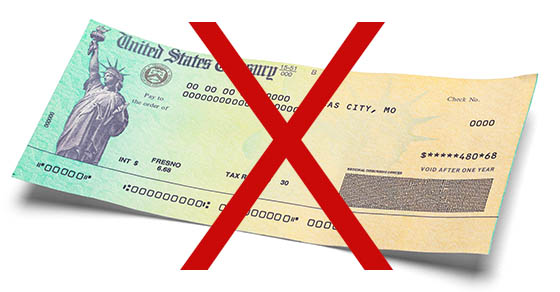The federal government has announced a major change that will affect how numerous Americans receive their tax refunds and federal benefit payments. The U.S. Treasury Department, the IRS and the Social Security Administration (SSA) will soon stop issuing federal paper checks. This transition is designed to increase efficiency, reduce fraud and lower administrative costs — but it also means that taxpayers must prepare for an all-electronic system.
Background information
Many taxpayers still receive paper checks for tax refunds. This is also the case with some Social Security benefits and other federal payments. Under an executive order (EO) signed by President Trump, paper checks will no longer be an option, effective September 30, 2025. Direct deposit will become the default (and only) method of payment, unless the government extends the deadline or provides exceptions.
In the EO, President Trump cites several reasons for eliminating paper checks. One is to reduce the risk of fraud. “Historically, Department of the Treasury checks are 16 times more likely to be reported lost or stolen, returned undeliverable, or altered than an electronic funds transfer,” the EO states.
Taxpayers without bank accounts
One significant challenge to making the transition away from paper checks is the “unbanked” population. These are people who don’t have traditional bank accounts. According to the FDIC, millions of Americans remain unbanked for various reasons, including lack of access, mistrust of banks or high fees.
The government may solve this challenge by issuing refunds on debit cards or encouraging financial institutions to offer free or low-fee accounts for affected taxpayers. Taxpayers without bank accounts should take steps now to open them to avoid delays in receiving their refunds.
Key implications
Some people may opt to request paper refund checks when filing their tax returns for reasons other than not having bank accounts. In some cases, they may have security or privacy concerns about providing account information to the IRS. Or perhaps they don’t know where they want to deposit their refunds when their tax returns are being prepared.
Here are three ways you may be affected after the federal government completes the transition from paper checks to an all-electronic system:
- A bank account will be required. Taxpayers must have U.S.-based bank accounts or credit union accounts to receive their refunds.
- There will be no more delays due to the mail. Direct deposit is faster than mailing paper checks, resulting in reduced wait times.
- The risk of lost or stolen checks will be eliminated. Electronic transfers will eliminate fraud and identity theft associated with paper checks.
Special considerations for U.S. citizens abroad
Americans living overseas may encounter problems receiving electronic refunds. The IRS typically requires a U.S. bank account for direct deposit. Foreign accounts generally don’t work with the IRS refund system.
To address this issue, the government may offer exceptions or alternative payment methods for individuals outside the United States, but the details are still unclear. Expats should stay informed and plan ahead. The elimination of paper checks could necessitate setting up a U.S.-based bank account or using financial services that provide U.S. banking solutions.
Impact on other taxpayers
The American Institute of CPAs (AICPA) has provided feedback to the Treasury Department about the change. While the AICPA is generally in favor of eliminating paper checks, it raised some issues about taxpayers who may encounter problems with the change.
For example, executors and trustees must fill out forms that currently don’t have a place on them to enter direct deposit information. In addition, the name on an estate checking account won’t match the name on a deceased person’s final tax return. This violates an electronic refund requirement that the name on a tax return must match the name on a bank account into which a refund is to be deposited.
For these and other situations, the AICPA has recommended that the government provide exceptions or extensions of the deadline for certain taxpayers. The group would also like the IRS to provide more guidance on how to proceed in specific situations.
Social Security beneficiaries
The SSA reports that fewer than 1% of beneficiaries currently receive paper checks. If you’re one of them, visit the SSA to change your payment information to include a bank account or enroll in an option to receive your benefits with a Direct Express® prepaid debit card.
Bottom line
The elimination of paper checks is a significant shift in how federal payments are made. While this move will likely result in faster and more secure transactions, it also means taxpayers need to be prepared well before the September 30 deadline. The IRS and SSA will likely release additional guidance and outreach campaigns in the coming months. If you have questions about how this change could impact your business or personal tax return, give the tax experts at The CJ Group a call – we’re here to help!
If you have questions about how this change will affect filing your tax returns, contact us.
© 2025










